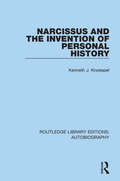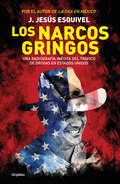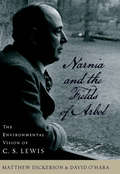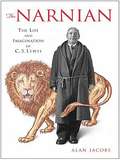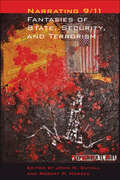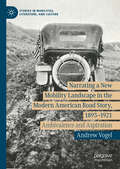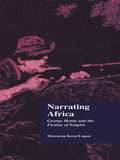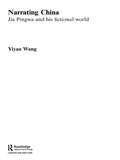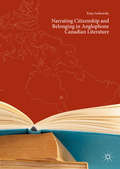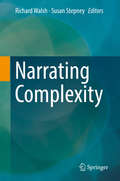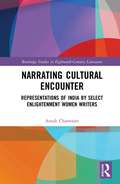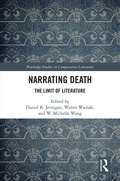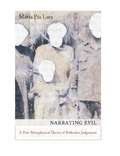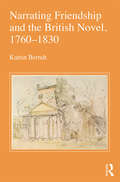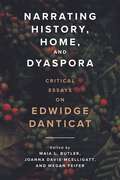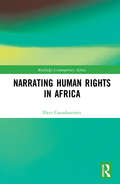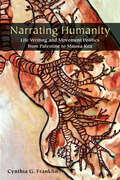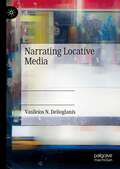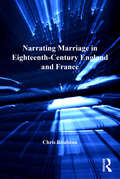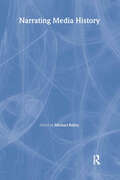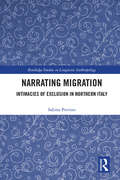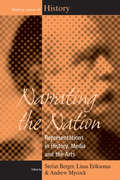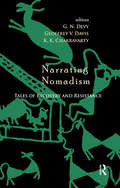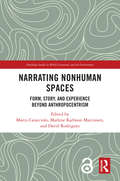- Table View
- List View
Narcissus and the Invention of Personal History (Routledge Library Editions: Autobiography #3)
by Kenneth J. KnoespelOriginally published in 1985. This investigation of Ovid’s fable takes a different tack to previous studies of the love lyric or the themes but looks at the creation of narrative strategies to explain Narcissus’ experience. The story has always been understood as literally impossible but invites readers to ask what is meant by the puzzling tale of deception and death. The limits placed on the fable by the commentaries of the medieval period allow us to appreciate the narrative expansion of the fable in twelfth and thirteenth-century poetry. Themes in this book are the way the fable is used as a means for knowledge of physical nature and the development of science; the importance of language in the fable and in its settings when rewritten in other texts, and psychoanalytic aspects of Echo and Narcissus. The fable has the capacity to represent mental life and psychological crisis within other narratives and this is also an important discussion point, based around the medieval text Roman de la Rose. The book also considers the wider Metamorphoses and Ovid’s importance for literature.
Los narcos gringos: Una radiografía inédita del tráfico de drogas en Estados Unidos
by J. Jesús EsquivelJ. Jesús Esquivel, autor de La D.E.A. en México, ha conseguido develar los entresijos del narcotráfico en Estados Unidos al sumergirse en la lectura de incontables expedientes judiciales, además de entrevistar a informantes clave.De San Francisco a Nueva York y de la línea divisoria hasta Chicago, Los narcos gringos describe con minucioso detalle los ingeniosos trucos de que se valen los brokers, los artífices del tráfico de estupefacientes, para llevar sus mercancías al interior de la Unión Americana y lavar el producto de su labor ilícita que hacen llegar a los cárteles mexicanos, el verdadero poder de la ecuación.A lo largo de la frontera entre México y Estados Unidos, una de las más extensas y complejas del mundo, tiene lugar uno de los comercios más perniciosos, aunque con implicaciones desiguales para una y otra nación: mientras de un lado se queda la sangre y la violencia, en el otro imperan la logística, los prejuicios raciales y la insaciable avidez de los consumidores; todo envuelto por un manto de corrupción .Relatos y retratos insólitos -algunos dignos de llegar a las pantallas cinematográficas, como el del inolvidable Don Henry Ford Jr.- desfilan por estas páginas para cuestionar mitos como la despenalización y el perdón presidencial a delincuentes, presentando en cambio un panorama demoledor sobre la adicción y el alcance de los intereses que buscan satisfacerla. Los narcos gringos no usan camisas de seda italiana o botas de pieles de animales exóticos, tampoco gruesas cadenas de oro y mucho menos relojes caros con incrustaciones de diamantes. El prototipo del narco gringo es una persona común y corriente que viste un pantalón de mezclilla, camisa o camiseta, que no usa anillos ni conduce autos caros.
Narnia and the Fields of Arbol: The Environmental Vision of C.S. Lewis (Culture of the Land #Cull)
by Matthew Dickerson David O'HaraAn exploration of the Chronicles of Narnia and the Space Trilogy that &“enriches our understanding of how to care for our world&” (Alan Jacobs, author of Breaking Bread with the Dead). In Narnia and the Fields of Arbol: The Environmental Vision of C. S. Lewis, authors Matthew Dickerson and David O&’Hara illuminate an important yet overlooked aspect of the author&’s visionary work. They go beyond traditional theological discussions of Lewis&’s writing to investigate themes of sustainability, stewardship of natural resources, and humanity&’s relationship to wilderness. The authors examine the environmental and ecological underpinnings of Lewis&’s work by exploring his best-known works of fantasy, including the seven books of the Chronicles of Narnia and the three novels collectively referred to as the Space Trilogy. Taken together, these works reveal Lewis&’s enduring environmental concerns, and Dickerson and O&’Hara offer a new understanding of his pioneering style of fiction. Narnia and the Fields of Arbol, the first book-length work on the subject, finds the author&’s legacy to have as much in common with the agrarian environmentalism of Wendell Berry as it does with the fantasy of J. R. R. Tolkien. In an era of increasing concern about deforestation, climate change, and other environmental issues, Lewis&’s work remains as pertinent as ever. The widespread adaption of his work in film lends credence to the author&’s staying power as an influential voice in both fantastical fiction and environmental literature. With Narnia and the Fields of Arbol, Dickerson and O'Hara have written a timely work of scholarship that offers a fresh perspective on one of the most celebrated authors in literary history. &“Both revelatory and a pleasure to read.&” —Robert Siegel, award-winning author of The Whalesong Trilogy
The Narnian: The Life and Imagination of C. S. Lewis
by Alan JacobsonBiography of Lewis and an analysis of his writings.
Narrating 9/11: Fantasies of State, Security, and Terrorism (A <I>Modern Fiction Studies</I> Book)
by John N. Duvall Robert P. Marzec.Contemporary fiction takes on 9/11, interrogating the global expansion of surveillance based on fantasies of US national security.Winner of the CHOICE Outstanding Academic Title of the Choice ACRLNarrating 9/11 challenges the notion that Americans have overcome the national trauma of the terrorist attacks on the World Trade Center and the Pentagon. The volume responds to issues of war, surveillance, and the expanding security state, including the Bush Administration’s policies on preemptive war, extraordinary rendition, torture abroad, and the suspension of privacy rights and civil liberties at home.Building on the work of Giorgio Agamben, Slavoj Žižek, and Donald Pease, the contributors focus on the ways in which post-9/11 narratives help make visible the fantasies that attempt to justify the ongoing state of exception and American exceptionalism. Narrating 9/11 examines a variety of contemporary narratives as they relate to the cultural construction of the neoliberal nation-state, a role that mediates the possibilities of ethnic and religious identity as well as the ability to imagine terrorism. Touching on some of the mainstays of 9/11 fiction, including Jonathan Safran Foer’s Extremely Loud & Incredibly Close and John Updike’s Terrorist, the book expands this particular canon by considering the work of such writers as Jess Walter, William Gibson, Lauren Groff, Ken Kalfus, Ian McEwan, Philip Roth, John le Carré, Laila Halaby, Michael Chabon, and Jarett Kobek. Narrating 9/11 pushes beyond a critical focus on domestic realism, offering chapters that examine speculative and genre fiction, postmodernism, climate change, and the evolving security state, as well as the television series Lost and the film Paradise Now.
Narrating a New Mobility Landscape in the Modern American Road Story, 1893–1921: Ambivalence and Aspiration (Studies in Mobilities, Literature, and Culture)
by Andrew VogelThis book examines travel narratives as a medium used by the American public to imagine and negotiate new ways to live in, move through, and share national space. Setting an array of archival material, including congressional deliberations, into analytical conversation with road stories by Walt Whitman, Paul Laurence Dunbar, Upton Sinclair, Emily Post, Zitkala-Ša, Henry Ford and many others, this book reframes our understanding of the origins of American automobility. The evidence gathered here sheds light on the processes by which the defining social infrastructure of the twentieth century came to be enacted, and also exposes the fraught debates and abiding misgivings that continue to roil infrastructure planning today. The insights captured in this study purposefully deepen our attention to questions of land use and collective responsibility at a moment when the ecological and social-justice consequences of American automobility must be thoroughly re-evaluated so that more conscientious mobility futures may be developed.
Narrating Africa: George Henty and the Fiction of Empire (Children's Literature and Culture #9)
by Mawuena Kossi LoganFirst published in 1999. Routledge is an imprint of Taylor & Francis, an informa company.
Narrating China: Jia Pingwa and his Fictional World (Routledge Contemporary China Series #Vol. 9)
by Yiyan WangJia Pingwa, whose novels have caused both fame and controversy, has an enormous readership throughout the Chinese speaking world. However, despite Pingwa's cultural significance and the use of his poetry, novels and prose in schools and universities, there has never been any substantial academic study of the writer and his writings. Filling that gap, this book examines the corpus of Pingwa’s writing and emphasizes his importance, prominence and relevance to contemporary Chinese society. This pioneering study discusses Pingwa's works in the light of ‘cultural nationalism’, showing how he links the cultural identity of China with the cultural authenticity of his local Shaanxi Province. In addition, the book highlights issues of nationalism in contemporary Chinese literature and underpins the significance of regional writing in negotiating China’s national identities.
Narrating Citizenship and Belonging in Anglophone Canadian Literature
by Katja SarkowskyThis book examines how concepts of citizenship have been negotiated in Anglophone Canadian literature since the 1970s. Katja Sarkowsky argues that literary texts conceptualize citizenship as political “co-actorship” and as cultural “co-authorship” (Boele van Hensbroek), using citizenship as a metaphor of ambivalent affiliations within and beyond Canada. In its exploration of urban, indigenous, environmental, and diasporic citizenship as well as of citizenship’s growing entanglement with questions of human rights, Canadian literature reflects and feeds into the term’s conceptual diversification. Exploring the works of Guillermo Verdecchia, Joy Kogawa, Jeannette Armstrong, Maria Campbell, Cheryl Foggo, Fred Wah, Michael Ondaatje, and Dionne Brand, this text investigates how citizenship functions to denote emplaced practices of participation in multiple collectives that are not restricted to the framework of the nation-state.
Narrating Complexity
by Richard Walsh Susan StepneyThis book stages a dialogue between international researchers from the broad fields of complexity science and narrative studies. It presents an edited collection of chapters on aspects of how narrative theory from the humanities may be exploited to understand, explain, describe, and communicate aspects of complex systems, such as their emergent properties, feedbacks, and downwards causation; and how ideas from complexity science can inform narrative theory, and help explain, understand, and construct new, more complex models of narrative as a cognitive faculty and as a pervasive cultural form in new and old media. The book is suitable for academics, practitioners, and professionals, and postgraduates in complex systems, narrative theory, literary and film studies, new media and game studies, and science communication.
Narrating Cultural Encounter: Representations of India by Select Enlightenment Women Writers (Routledge Studies in Eighteenth-Century Literature)
by Arnab ChatterjeeThis book interrogates and historicises eighteenth-century British women writers’ responses to India through the novel and travel writing to bring out the polyvalent space arising out of their complex negotiation with the colonial discourse. Though British women enjoyed their privileged racial status as the utilisers of colonial riches, they articulated their voice of dissent when they faced the politics of subordination in their own society and identified them with the marginalised status of the colonised Indians. This brings out the complicity and critique of the colonial discourse of British women writers and foregrounds their ambivalent responses to the colonial project. This book provides detailed textual analysis of the works of Phebe Gibbes, Elizabeth Hamilton, Lady Morgan, Jemima Kindersley and Eliza Fay through critical insights from the idea of the Enlightenment, postcolonial theory and feminist thought. It also foregrounds new perspectives to colonial discourse vis-à-vis the representation of India by locating the dialogic strain within the British narratives about India.
Narrating Death: The Limit of Literature
by Daniel K. Jernigan Walter Wadiak Michelle WangDrawing on literary and visual texts spanning from the twelfth century to the present, this volume of essays explores what happens when narratives try to push the boundaries of what can be said about death.
Narrating Evil: A Postmetaphysical Theory of Reflective Judgment (New Directions in Critical Theory #20)
by Maria LaraConceptions of evil have changed dramatically over time, and though humans continue to commit acts of cruelty against one another, today we possess a clearer, more moral way of analyzing them. In Narrating Evil, María Pía Lara explores what has changed in our understanding of evil, why the transformation matters, and how we can learn from this specific historical development.Drawing on Immanuel Kant's and Hannah Arendt's ideas about reflective judgment, Lara argues that narrative plays a key role in helping societies acknowledge their pasts. Particular stories haunt our consciousness and lead to a kind of examination and dialogue that shape notions of morality. A powerful description of a crime can act as a filter, helping us to draw conclusions about what constitutes a moral wrong, and public debates over these narratives allow us to construct a more accurate picture of historical truth, leading to a better understanding of why such actions are possible.In building her argument, Lara considers Greek tragedies, Shakespeare's depictions of evil, Joseph Conrad's literary metaphors, and movies that portray human cruelty. Turning to such philosophers and writers as Jürgen Habermas, Walter Benjamin, Primo Levi, Giorgio Agamben, and Ariel Dorfman, Lara defines a reflexive relationship between an event, the narrative of the event, and the public reception of the narrative, and she proves that the stories of perpetrators and sufferers are always intertwined.The process of disclosure, debate, and the public fashioning of collective judgment are vital methods through which we make sense not only of new forms of cruelty but of past crimes as well. Narrating Evil describes the steps of this process and why they are a crucial part of our attempt to build a different, more just world.
Narrating Friendship and the British Novel, 1760-1830
by Katrin BerndtFriendship has always been a universal category of human relationships and an influential motif in literature, but it is rarely discussed as a theme in its own right. In her study of how friendship gives direction and shape to new ideas and novel strategies of plot, character formation, and style in the British novel from the 1760s to the 1830s, Katrin Berndt argues that friendship functions as a literary expression of philosophical values in a genre that explores the psychology and the interactions of the individual in modern society. In the literary historical period in which the novel became established as a modern genre, friend characters were omnipresent, reflecting enlightenment philosophy’s definition of friendship as a bond that civilized public and private interactions and was considered essential for the attainment of happiness. Berndt’s analyses of genre-defining novels by Frances Brooke, Mary Shelley, Sarah Scott, Helen Maria Williams, Charlotte Lennox, Walter Scott, Jane Austen, and Maria Edgeworth show that the significance of friendship and the increasing variety of novelistic forms and topics represent an overlooked dynamic in the novel’s literary history. Contributing to our understanding of the complex interplay of philosophical, socio-cultural and literary discourses that shaped British fiction in the later Hanoverian decades, Berndt’s book demonstrates that novels have conceived the modern individual not in opposition to, but in interaction with society, continuing Enlightenment debates about how to share the lives and the experiences of others.
Narrating History, Home, and Dyaspora: Critical Essays on Edwidge Danticat
by Thadious M. DavisContributions by Cécile Accilien, Maria Rice Bellamy, Gwen Bergner, Olga Blomgren, Maia L. Butler, Isabel Caldeira, Nadège T. Clitandre, Thadious M. Davis, Joanna Davis-McElligatt, Laura Dawkins, Megan Feifer, Delphine Gras, Akia Jackson, Tammie Jenkins, Shewonda Leger, Jennifer M. Lozano, Marion Christina Rohrleitner, Thomás Rothe, Erika V. Serrato, Lucía Stecher, and Joyce White Narrating History, Home, and Dyaspora: Critical Essays on Edwidge Danticat contains fifteen essays addressing how Edwidge Danticat’s writing, anthologizing, and storytelling trace, (re)construct, and develop alternate histories, narratives of nation building, and conceptions of home and belonging. The prolific Danticat is renowned for novels, collections of short fiction, nonfiction, and editorial writing. As her experimentation in form expands, so does her force as a public intellectual. Danticat’s literary representations, political commentary, and personal activism have proven vital to classroom and community work imagining radical futures. Among increasing anti-immigrant sentiment and containment and rampant ecological volatility, Danticat’s contributions to public discourse, art, and culture deserve sustained critical attention. These essays offer essential perspectives to scholars, public intellectuals, and students interested in African diasporic, Haitian, Caribbean, and transnational American literary studies. This collection frames Danticat’s work as an indictment of statelessness, racialized and gendered state violence, and the persistence of political and economic margins. The first section of this volume, “The Other Side of the Water,” engages with Danticat’s construction and negotiation of nation, both in Haiti and the United States; the broader dyaspora; and her own, her family’s, and her fictional characters’ places within them. The second section, “Welcoming Ghosts,” delves into the ever-present specter of history and memory, prominent themes found throughout Danticat’s work. From origin stories to broader Haitian histories, this section addresses the underlying traumas involved when remembering the past and its relationship to the present. The third section, “I Speak Out,” explores the imperative to speak, paying particular attention to the narrative form with which such telling occurs. The fourth and final section, “Create Dangerously,” contends with Haitians’ activism, community building, and the political and ecological climate of Haiti and its dyaspora.
Narrating Human Rights in Africa (Routledge Contemporary Africa)
by Eleni CoundouriotisNarrating Human Rights in Africa claims human rights from the perspective of artists from the African continent and situates the key theoretical concepts in African perspectives, undercutting the stereotypes of victimhood and voicelessness. Instead of positioning literary texts as illustrative of points already theorized elsewhere, the author foregrounds the literature itself to show the concepts it offers, the ideas and responses stemming from complex historical circumstances in Africa and expressed by African writers. The book focuses on how narrative creates new categories of thought challenging human rights dogma, whereas the sum of the literary voices evoked also stands by the values of social justice and protection of human rights. The chapters take up key challenges to the narration of human rights in which the contribution of African writers is particularly important. This includes human dignity in the resistance to apartheid, the figure of the child soldier, how humanitarianism’s images affect representational strategies of contemporary African writers, the challenge of testifying about rape in war, how to evoke the disappeared body of the torture victim, the centrality of flight in the refugee and migrant experiences, and finally the long shadow of the "heart of darkness" motif. Offering a sustained examination of the narrative treatment of key human rights concerns as expressed by African writers, this book will be of interest to scholars of African literature, postcolonial studies, African studies, and human rights.
Narrating Humanity: Life Writing and Movement Politics from Palestine to Mauna Kea
by Cynthia FranklinIn Narrating Humanity, Cynthia G. Franklin makes a critical intervention into practices of life writing and contemporary crises in the United States about who counts as human. To enable this intervention, she proposes a powerful new analytical language centered on “narrative humanity,” “narrated humanity,” and “grounded narrative humanity” and foregrounds concepts of the human that emerge from movement politics. While stories of “narrative humanity” propagate the status quo, Franklin argues, those of “narrated humanity” and “grounded narrative humanity” are ones that articulate ways of being human necessary for not only surviving but also thriving during a time of accelerating crises brought on by the intersecting effects of racial capitalism, imperialism, heteropatriarchy, and climate change.Through chapters focused on Hurricane Katrina; Black Lives Matter; the Palestinian-led Boycott, Divestment and Sanctions movement; and the Native Hawaiian movement to protect Mauna a Wākea, Franklin reveals how life writing can be mobilized to do more than perpetuate dominant forms of dehumanization that underwrite violence. She contends that life narratives can help materialize ways of being human inspired by these contemporary political movements that are based on queer kinship, inter/national solidarity, abolitionist care, and decolonial connectivity among humans, more-than-humans, land, and waters. Engaging writers, artists, and activists who inspire radical forms of relationality, she comes to write side-by-side with them in her own acts of narrated humanity by refusing the boundaries between autobiography, community-based activism, and literary and cultural criticism.
Narrating India: The Novel in Search of the Nation
by E. V. Ramakrishnan"The novels written both before and after independence in various Indian languages narrate the Indian nation in all its complexity, diversity and plurality." -Introduction
Narrating Locative Media
by Vasileios N. DelioglanisThis book offers a multidisciplinary approach to locative media, concentrating on specific authors and practitioners whose works exist in print and digital manifestations. The book shapes the discourse for an extensive theorization of locative media works from a narrative perspective. It investigates how different genres ⸺ print novels, fictional and non-fictional locative narratives, locative games, and audio texts ⸺ are affected by locative media practice. Part I examines print manifestations of locative media in William Gibson’s fiction. Part II discusses e-book and audio book locative narrative experimentations, suggesting ways to create and categorize locative texts. Drawing on hypertext theory, Part III views Niantic locative games as an instantiation of locative media storytelling practice that challenges digital narrativity. This study captures a transition from a print-based textuality to a digital locative textuality and culture, and proposes flexible innovative models of interpreting narrative textual forms emerging from the convergence of locative and narrative media.
Narrating Marriage in Eighteenth-Century England and France
by Chris RoulstonIn the eighteenth century, when the definition of marriage was shifting from one based on an hierarchical model to one based on notions of love and mutuality, marital life came under a more intense cultural scrutiny. This led to paradoxical forms of representation of marriage as simultaneously ideal and unlivable. Chris Roulston analyzes how, as representations of married life increased, they challenged the traditional courtship model, offering narratives based on repetition rather than progression. Beginning with English and French marital advice literature, which appropriated novelistic conventions at the same time that it cautioned readers about the dangers of novel reading, she looks at representations of ideal marriages in Pamela II and The New Heloise. Moving on from these ideal domestic spaces, bourgeois marriage is then problematized by the discourse of empire in Sir George Ellison and Letters of Mistress Henley, by troublesome wives in works by Richardson and Samuel de Constant, and by abusive husbands in works by Haywood, Edgeworth, Genlis and Restif de la Bretonne. Finally, the alternative marriage narrative, in which the adultery motif is incorporated into the marriage itself, redefines the function of heteronormativity. In exploring the theoretical issues that arise during this transitional period for married life and the marriage plot, Roulston expands the debates around the evolution of the modern couple.
Narrating Media History (Communication and Society)
by Michael BaileyBased on the work of media historian, James Curran, Narrating Media History explores British media history as a series of competing narratives. This unique and timely collection brings together leading international media history scholars, not only to identify and contrast the various interrelationships between media histories, but also to encourage dialogue between different historical, political, and theoretical perspectives including: liberalism, feminism, populism, nationalism, libertarianism, radicalism and technological determinism. Essays by distinguished academics cover television, radio, newspaper press and advertising (among others) and illustrate the particularities, affinities, strengths and weaknesses within media history. Each section includes a brief introduction by the editor, with discussion topics and suggestions for further reading, making this an invaluable guide for students of media history.
Narrating Migration: Intimacies of Exclusion in Northern Italy (Routledge Studies in Linguistic Anthropology)
by Sabina PerrinoThis book reflects on the myriad ways in which forms of exclusion and inclusion play out in narratives of migration, focusing on the case of Northern Italian narratives in today’s superdiverse Italy. Drawing on over a decade of the author’s fieldwork in the region, the volume examines the emergence of racialized language in conversations about migrants or migration issues in light of increasing recent migratory flows in the European Union, couched in the broader context of changing socio-political forces such as anti-immigration policies and nativist discourse in political communication in Italy. The book highlights case studies from everyday discourse in both villages and cities and at different levels of society to explore these "intimacies of exclusion," the varying degrees to which inclusion and exclusion manifest themselves in conversation on migration. The book also employs a narrative practice-based approach which considers storytelling as a more dynamic form of discourse, thus allowing for equally new ways of analyzing their content and impact. Offering a valuable contribution to the growing literature on narratives of migration, this volume is key reading for graduate students and scholars in linguistic anthropology, sociolinguistics, sociocultural anthropology, language and politics, and migration studies.
Narrating The Nation: Representations in History, Media and the Arts (Making Sense of History #11)
by Andrew Mycock Linas Eriksonas Stefan BergerA sustained and systematic study of the construction, erosion and reconstruction of national histories across a wide variety of states is highly topical and extremely relevant in the context of the accelerating processes of Europeanization and globalization. However, as demonstrated in this volume, histories have not, of course, only been written by professional historians. Drawing on studies from a number of different European nation states, the contributors to this volume present a systematic exploration, of the representation of the national paradigm. In doing so, they contextualize the European experience in a more global framework by providing comparative perspectives on the national histories in the Far East and North America. As such, they expose the complex variables and diverse actors that lie behind the narration of a nation.
Narrating Nomadism: Tales of Recovery and Resistance
by G. N. Devy; Geoffrey V. Davis; K. K. ChakravartyNarrating Nomadism provides an unflinching account of ethnic groups and nomadic communities across the world that were branded as ‘criminal’ during colonial times. It explores the tragic effect of the new identity imposed on them, the traumatic survival of these communities and cultures, and the creative expression of this experience in their arts and literature in the form of resistance. Presenting specific contexts and locations of cultural devastation in history, the volume traces colonial social imagination as such, showing how the grossly misperceived non-sedentary communities in the colonies were subjected to the mission of ‘settling’ them. The essays presented here document these alternative histories from perspectives ranging from literary criticism and art history to ethnography and socio-linguistics, highlighting in what ways different nomadic communities negotiate discrimination and challenge in contemporary times, while finding remarkable convergence in their local histories and collective testimonies.This anthology opens up a new area in postcolonial studies as well as cultural anthropology by bringing the viewpoint of marginalized communities and their cultural rights to bear upon history, society and culture. It places an activist’s ‘view from below’ at the centre of literary interpretation, engages with oral history more substantially than folklore studies usually do, and brings together several historical narratives hitherto unexplored. This will be essential for students of anthropology, sociology, cultural studies, history, linguistics, post-colonial studies, literature and tribal studies, as well as the general reader.
Narrating Nonhuman Spaces: Form, Story, and Experience Beyond Anthropocentrism (Routledge Studies in World Literatures and the Environment)
by Marco Caracciolo, Marlene Karlsson Marcussen, and David RodriguezRecent debates about the Anthropocene have prompted a re-negotiation of the relationship between human subjectivity and nonhuman matter within a wide range of disciplines. This collection builds on the assumption that our understanding of the nonhuman world is bound up with the experience of space: thinking about and with nonhuman spaces destabilizes human-scale assumptions. Literary form affords this kind of nonanthropocentric experience; one role of the critic in the Anthropocene is to foreground the function of space and description in challenging the conventional link between narrative and human (inter)subjectivity. Bringing together New Formalism, ecocriticism, and narrative theory, the included essays demonstrate that literature can transgress the strong and long-established boundary of the human frame that literary and narrative scholarship clings to. The focus is firmly on the contemporary but with strategic samplings in earlier cultural texts (the American transcendentalists, modernist fiction) that anticipate present-day anxieties about the nonhuman, while at the same time offering important conceptual tools for working through them.
